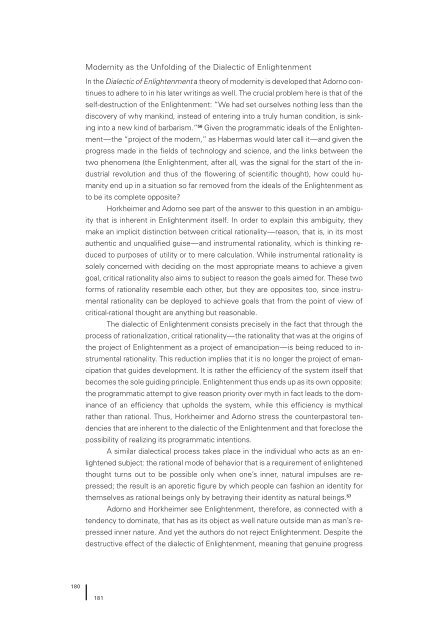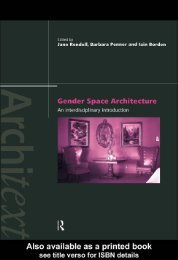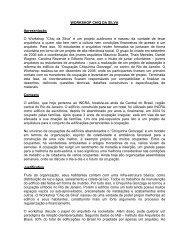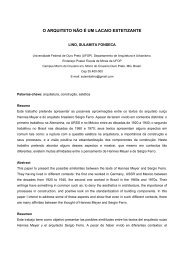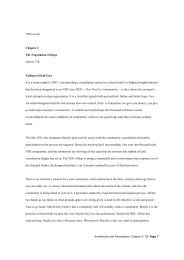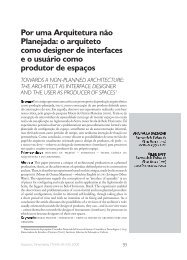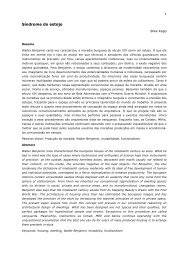Architecture and Modernity : A Critique
Architecture and Modernity : A Critique
Architecture and Modernity : A Critique
Create successful ePaper yourself
Turn your PDF publications into a flip-book with our unique Google optimized e-Paper software.
180<br />
<strong>Modernity</strong> as the Unfolding of the Dialectic of Enlightenment<br />
In the Dialectic of Enlightenment a theory of modernity is developed that Adorno con-<br />
tinues to adhere to in his later writings as well. The crucial problem here is that of the<br />
self-destruction of the Enlightenment: “We had set ourselves nothing less than the<br />
discovery of why mankind, instead of entering into a truly human condition, is sinking<br />
into a new kind of barbarism.” 56 Given the programmatic ideals of the Enlightenment—the<br />
“project of the modern,” as Habermas would later call it—<strong>and</strong> given the<br />
progress made in the fields of technology <strong>and</strong> science, <strong>and</strong> the links between the<br />
two phenomena (the Enlightenment, after all, was the signal for the start of the industrial<br />
revolution <strong>and</strong> thus of the flowering of scientific thought), how could humanity<br />
end up in a situation so far removed from the ideals of the Enlightenment as<br />
to be its complete opposite?<br />
Horkheimer <strong>and</strong> Adorno see part of the answer to this question in an ambiguity<br />
that is inherent in Enlightenment itself. In order to explain this ambiguity, they<br />
make an implicit distinction between critical rationality—reason, that is, in its most<br />
authentic <strong>and</strong> unqualified guise—<strong>and</strong> instrumental rationality, which is thinking reduced<br />
to purposes of utility or to mere calculation. While instrumental rationality is<br />
solely concerned with deciding on the most appropriate means to achieve a given<br />
goal, critical rationality also aims to subject to reason the goals aimed for. These two<br />
forms of rationality resemble each other, but they are opposites too, since instrumental<br />
rationality can be deployed to achieve goals that from the point of view of<br />
critical-rational thought are anything but reasonable.<br />
The dialectic of Enlightenment consists precisely in the fact that through the<br />
process of rationalization, critical rationality—the rationality that was at the origins of<br />
the project of Enlightenment as a project of emancipation—is being reduced to instrumental<br />
rationality. This reduction implies that it is no longer the project of emancipation<br />
that guides development. It is rather the efficiency of the system itself that<br />
becomes the sole guiding principle. Enlightenment thus ends up as its own opposite:<br />
the programmatic attempt to give reason priority over myth in fact leads to the dominance<br />
of an efficiency that upholds the system, while this efficiency is mythical<br />
rather than rational. Thus, Horkheimer <strong>and</strong> Adorno stress the counterpastoral tendencies<br />
that are inherent to the dialectic of the Enlightenment <strong>and</strong> that foreclose the<br />
possibility of realizing its programmatic intentions.<br />
A similar dialectical process takes place in the individual who acts as an enlightened<br />
subject: the rational mode of behavior that is a requirement of enlightened<br />
thought turns out to be possible only when one’s inner, natural impulses are repressed;<br />
the result is an aporetic figure by which people can fashion an identity for<br />
themselves as rational beings only by betraying their identity as natural beings. 57<br />
Adorno <strong>and</strong> Horkheimer see Enlightenment, therefore, as connected with a<br />
tendency to dominate, that has as its object as well nature outside man as man’s repressed<br />
inner nature. And yet the authors do not reject Enlightenment. Despite the<br />
destructive effect of the dialectic of Enlightenment, meaning that genuine progress<br />
181


